Kids 6 months to 4 years now eligible for COVID vaccine. Here's what you need to know.
Children ages 6 months to 4 years can now be vaccinated for COVID-19.
On Saturday, the Centers for Disease Control and Prevention's advisory committee voted to approve the Pfizer vaccine for this age group and the Moderna vaccine for ages 6 months to 5 years, 6 years to 11 years and 12 years to 17 years.
Previously only the Pfizer vaccine for ages 6-11 and 12-17 had been given emergency use authorization.
CDC director Dr. Rochelle P. Walensky also signed off on the plan.
The move follows a busy week for both the FDA as well. Last Tuesday and Wednesday, the FDA and its advisory committee signed off on giving these vaccines emergency use authorization.

Where can kids be vaccinated?
Your pediatrician's office is your best bet for children 2 and younger. They vaccines are in the process of making their way to local offices.
Many pharmacies also are in the process of making these vaccines available for ages 3 and older. As of Sunday, Tarrytown Pharmacy and Walgreens had begun their appointment system for this age group and had appointments available this week. H-E-B has its system up, but we couldn't find any locations with these vaccines yet. CVS had not yet converted its system for this age group.
You also can check with Austin Public Health's Shots for Tots clinics. Austin Public Health will have walk-up clinics for children younger than 5 with both the Pfizer and Moderna vaccines this week at Old Sims Elementary, 1203 Springdale Road: 2-7 p.m. Wednesday and Thursday and 11 a.m.-3 p.m. Saturday.
Is COVID-19 still a threat?
While cases have waned since the delta variant last summer and the omicron last winter, cases are rising again, said Dr. Stanley Spinner, vice president and chief medical officer at Texas Children's Pediatrics and Texas Children's Urgent Care. "We're gearing up for an interesting summer," he said in May.
Austin had been in low-level of transmission, but rose to medium level because our county had more than 200 new cases per 100,000 people last week. On Thursday it dipped down again to low level agaiwith 190.12. Hays and Caldwell counties remain in the medium level. Bastrop, Burnet and Williamson counties are also low.
What is the dosing for these COVID vaccines?
For the Moderna vaccine, two doses are given a month apart make up the primary series. Kids ages 12-17 take the same amount as adults, 100 micrograms. Kids 6 years to 11 will get 50 micrograms. Infants 6 months to kids age 5 will get 25 micrograms.
People ages 18 and older can get a Moderna booster five months after the primary series; people age 50 or older can get a second booster four months after the first booster. The Moderna booster is a half dose. Moderna is still studying boosters for its vaccine recipients ages 6 months to 17 years.
The Pfizer vaccine is a three-dose primary series for kids ages 4 to 6 months. This age group gets the second dose three weeks after the first, and a third dose eight weeks after the second one. This age group's dose is 3 micrograms.
It's a two-dose primary series for people ages 5 and older. The 5-11 year-olds get a 10-microgram dose. People 12 and up get 30-microgram dose.
A booster for ages 5 and older has been recommended for five months after the primary series has been completed. A second booster is recommended four months after the first booster for people age 50 years old and older or people 12 and older who are immune compromised. The Pfizer booster is the same dosage as the primary series.
Boosters: Should your child get the COVID-19 booster? Central Texas experts weigh in
How effective are the COVID vaccines?
Pfizer reports a 80.3% vaccine efficacy for children ages 6 months to 4 years who had had three doses during the time of the omicron varient. This effectiveness only comes 30 days after the third dose, according to Pfizer.
Moderna reports 93.3% vaccine effectiveness in the 12-17 age group for initial through the alpha strains, 76.8% for ages 6-11 during the delta strain and 36.8% for ages 2-5 and 50.6% for ages 6-23 months during the omicron period. Moderna says these rates are similar to efficacy rates for adults with two doses during omicron.
Cases rising: COVID-19 spread worsens to medium level for Travis, Hays counties. Here's what that means

Do kids under 5 need a COVID vaccine?
About 20% of cases were in kids during the omicron surge. Omicron especially saw a rise in kids being hospitalized for COVID-19 and even dying.
"You never know who from that age group is going to be seriously ill," said Dr. Anas Daghestani, internal medicine physician and CEO at Austin Regional Clinic.
In the U.S., since COVID-19 started, kids have died from COVID-19 — 442 in the birth to 4 years range, according to the CDC, and 815 in the 5 to 18 age group.
"As a parent, the last thing you want is for a kid to be in the hospital or worse, for something they could be vaccinated against," Spinner said. "The amount of guilt they have involved, it can be overwhelming to see their kid hooked up to ventilator with tubes coming out of them. They are too precious of a commodity being your child to take that risk."
This virus has been constantly changing, including becoming more transmissible with each variant.
"This is taking another shot at outmaneuvering the virus," said Dr. Anas Daghestani, internal medicine physician and CEO at Austin Regional Clinic.
Ending a pandemic: When will COVID-19 be over? How Austin doctors, scientists predict the future of pandemic
One of the frustrations of pediatricians is not enough of the 5-11 year olds, who could begin getting vaccinated starting in November, are getting vaccinated or getting a second and now booster dose. In the United States, about 36% of 5-11 year olds have had one dose; 29% have had a second dose. In Texas, that rate is 37% and 25%. Boosters for 5-11 year olds became available in May.
If you have questions or concerns about the vaccine, Dr. Meena Iyer, medical director at Dell Children's Medical Center of Central Texas, recommends that parents "talk to their pediatrician and primary care provider to understand the effects of the vaccine," she said. "There's a lot of wrong information on the Internet. Go to the right information."
What about potential side effects?
The side effects were similar to what adults or older children experienced: headache, fever, soreness, redness at the injection site, irritability, nausea, vomiting, fatigue.
The side effect of myocarditis, an inflammation of the heart muscle, is highest for people ages 18 to 25, and higher for men, and happens about a week after the second dose. There are slightly higher case rates in people who received Moderna compared with people who received Pfizer, but in the studies in this age group, they didn't find it.
The rates of myocarditis is three times higher in people who get COVID-19 than from the vaccination, Spinner said.
There was also a case of a febrile seizure, which is a known side effect for other vaccines in kids this age.
In the Pfizer study of this age group, three kids did have a swollen lymph node reaction.
Lingering symptoms: COVID-19 can affect brain for months, years to come, research from UT, others finds
Which kids shouldn't get vaccinated?
It would be a rare exception, Spinner said. Typically, it's just if they are allergic to the vaccine ingredients.
Like any vaccine, if a kid was sick at the time, they would just need to wait until they were well, he said, to get vaccinated.
Can you vaccinate for COVID-19 while getting other vaccines?
Yes. You can get caught up on or stay on track with your child's other vaccines while getting the COVID-19 vaccine.
What about infants younger than 6 months?
Infants get some COVID-19 protection from their mothers in pregnancy if their mothers are vaccinated. Some COVID-19 antibodies also pass from mom to baby through breast milk.
Vaccinating moms: Pregnant? Local doctors want you to get your COVID-19 vaccine
Is it better for kids to just go ahead and get COVID-19 than to get a vaccine?
Before there was a chicken pox vaccine, parents would sometimes hold chicken pox parties to get their kid's infection over with.
Just going ahead and getting COVID-19 is not a good idea, doctors say.
"Even though most kids don't get really sick, from COVID some do," Linnell said.
The vaccine lessens the risks of severe illness, hospitalization and deaths, health experts say. The immunity from natural infection can wane faster than the immunity built up by vaccine.
Kids also can have lingering symptoms from long COVID, as well as multisystem inflammatory syndrome, an inflammation of the organs, including the heart, weeks after a COVID-19 infection. More than 8,000 kids have been hospitalized with multisystem inflammatory syndrome and 69 kids have died because of that.
Linnell also thinks about these conditions that can happen after a COVID-19 infection. "Even though the risk is not as high as an adult risk, it's not zero," Linnell said. "When it's your kid who gets chronically ill from something that can be prevented from a vaccine, it's 100 percent."
If my child has already had COVID-19, do they need to get vaccinated?
The immunity from the natural infection is not as strong as the immunity that comes with the vaccine. The vaccine is recommended to prevent serious illness, hospitalization or death from a new COVID-19 infection.
People are getting COVID-19 more than once.
For anyone who has had COVID-19, they should wait at least 10 days after the symptoms have gone before getting a dose of the vaccine.
Variants arrive: New COVID-19 omicron variants show up in Travis County as cases rise
This article originally appeared on Austin American-Statesman: COVID vaccines for 6 months to 4 years old: What you need to know

